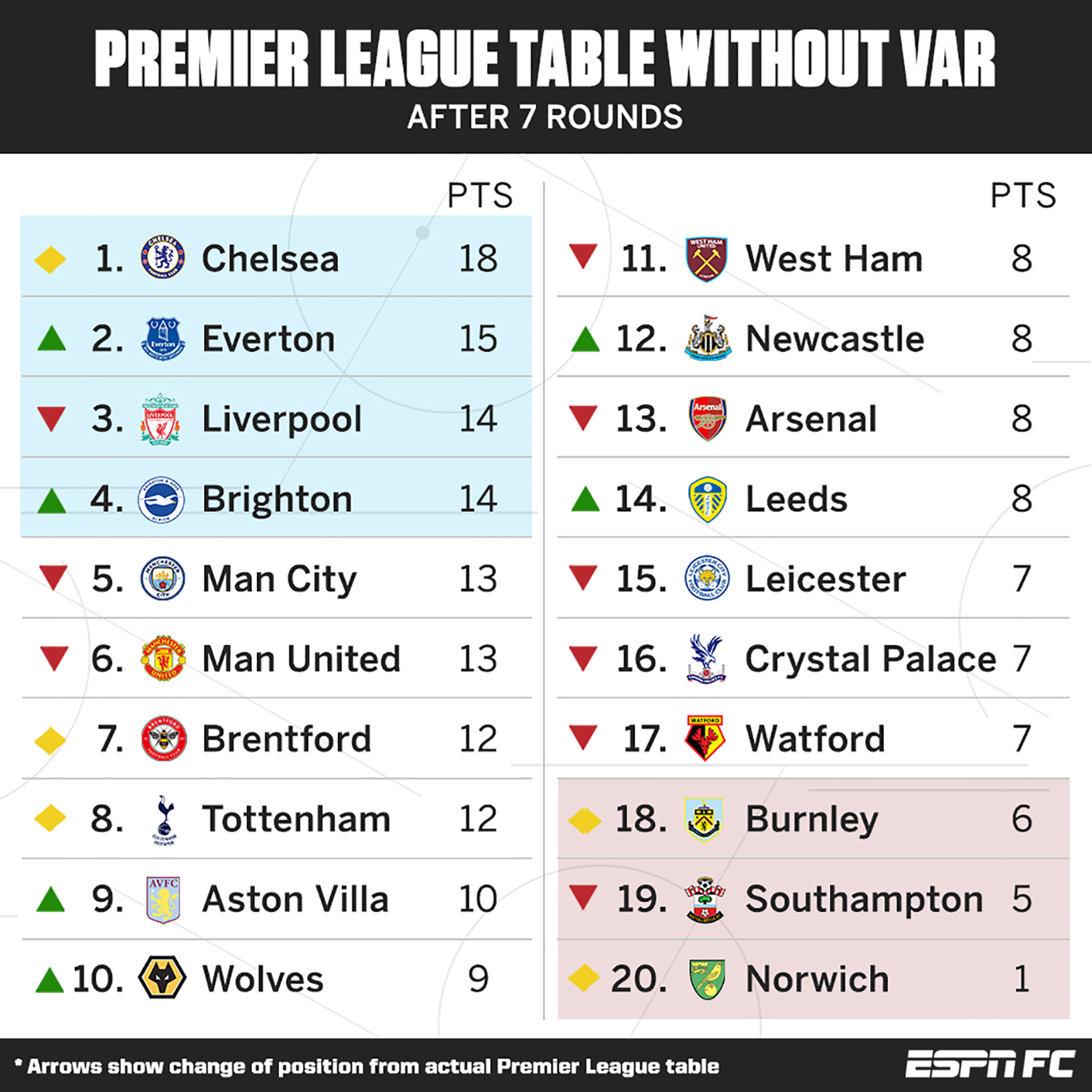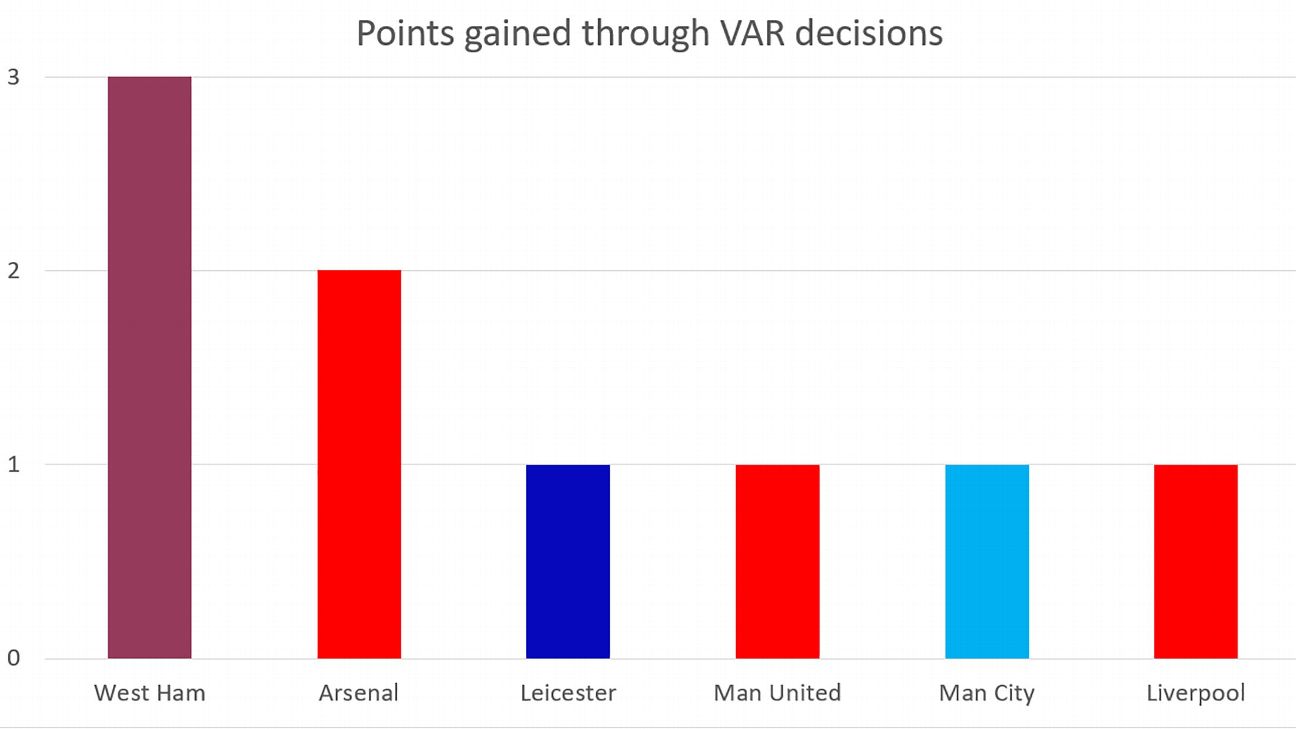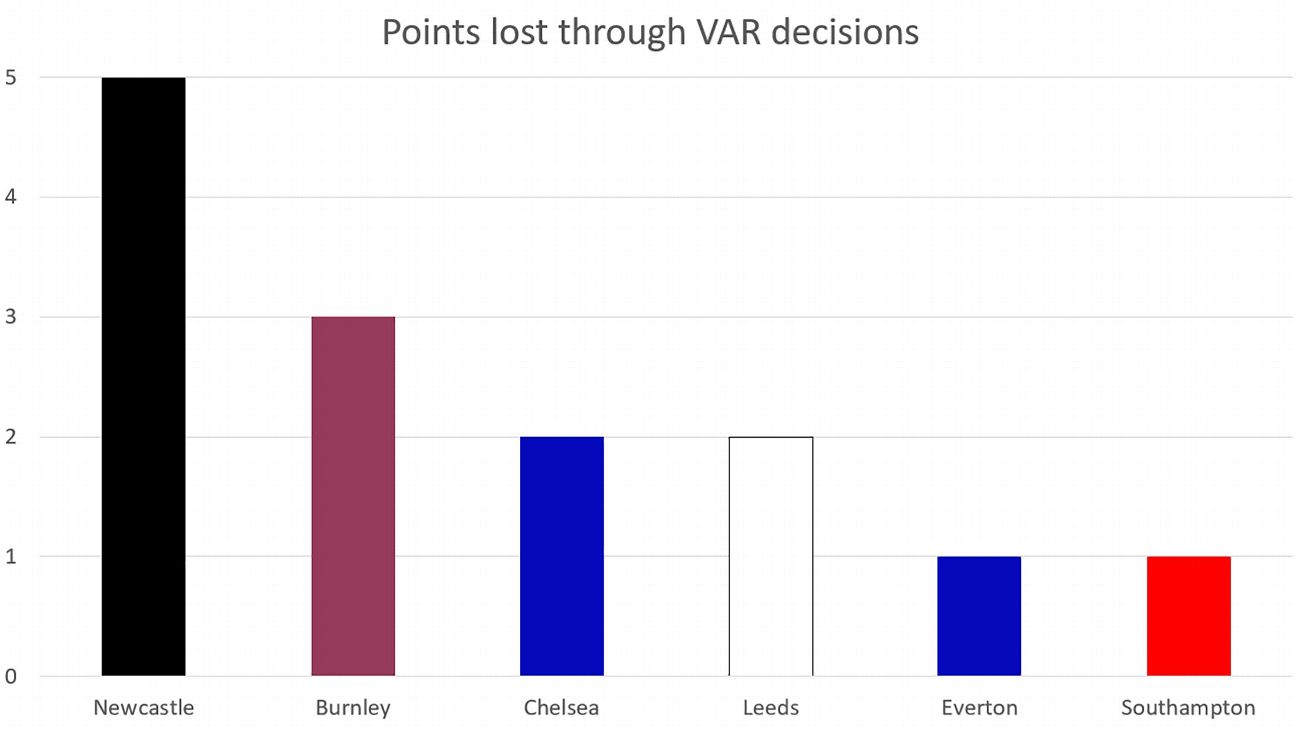Supporters always argue about which teams get the better of the VAR decisions in the Premier League, and this season we aim to give you the definitive answer.
It's not just about the number of times a team gets a favourable VAR call or about how many goals are affected. What's more important is when these VAR decisions take place, how they might have changed the course of the game and, crucially, whether that impact would ultimately have changed the final score.
ESPN brings you the VAR Effect Table. We've taken all 22 VAR decisions in the Premier League so far this season and calculated how they might have changed the outcome of matches. We'll continue to track VAR throughout the season and find out who the true winners and losers are.
- JUMP TO: The losers without VAR | The winners without VAR
How we work out the VAR Effect Table
We take only the first VAR overturn in each game, because the calculation considers that any subsequent VAR incident wouldn't have happened because the whole direction of the game has been altered. (Think of it like a Marvel timeline, or the plot of any time travel movie.)
The VAR decision is then reversed to the original on-field call -- so if a goal is disallowed for offside, it's given as a goal.
If a penalty has been cancelled, it is considered to have been awarded and scored, unless the team in question has a penalty conversion record below 50% over the season. For instance, so far this season West Ham have missed both their penalties, while every other team but Man United has a 100% record. If below 50%, the penalty may be judged to have been missed.
If a team has been awarded a goal through a penalty or an incorrect offside through VAR, the goal is disallowed.
We then take into account a series of factors before settling on a predicted outcome:
Team form: Results in the previous six matches give an indication of how a team has been playing generally.
Time of incident: For instance, if an incident happens late in the game, it's less likely that the scoreline would change again after this point.
xG at time of incident: This allows us to take into account which team has been creating the better chances and is in the ascendancy.
Team strength: As well as form, a team's general strength plays a part. This takes into account league position, and a team's goal-scoring and defensive records across the season.
Impact of incident: For example, a red-card decision being reversed may change the outcome of a match.
These results have then been used to modify the table and work out what impact VAR has had on teams' positions this season.
The table shows each team's position after the amended results, with the arrows indicating if their league position is better or worse without VAR.

The big losers without VAR
Four of the Big Six clubs drop points, showing they have enjoyed favourable VAR decisions at key moments.
Arsenal's season suddenly gets a little bit worse, dropping two points and two places into 13th. VAR cancelled a Burnley penalty when Aaron Ramsdale was adjudged to have brought down Matej Vydra, when the Gunners were 1-0 up. Burnley's xG was slightly lower than Arsenal's at the time of the incident, so after a converted penalty a 1-1 draw is the predicted result.
Manchester City and Manchester United both drop a point and two places -- and out of the top four -- without VAR. City's draw at home to Southampton becomes a 1-0 defeat, with the penalty and red card against Kyle Walker reinstated after both were controversially cancelled through VAR. Though the incident came after an hour, City hadn't recorded an xG above 1.0, and would have played out the remainder of the game with 10 men. Man United's draw at home to Everton becomes a 2-1 loss, with Yerry Mina's 85th-minute offside "winner" allowed. The results enable Brighton & Hove Albion to climb up two places to fourth, even though their points tally remains unchanged.
And after Liverpool fans last season bemoaned the impact of VAR, they benefit this season and would lose the point they gained at home to Chelsea. Thomas Tuchel's men were 1-0 up in first-half injury time when a penalty and red card were awarded through VAR, for Reece James' handball on the goal-line. With Chelsea not having conceded a goal in the Premier League up to that point, their restored 11 men are predicted to have held on for a 1-0 victory.
But the biggest beneficiaries of VAR have been West Ham United, who lose three points and two places to drop into 11th, as the 4-2 win at Newcastle United becomes a 2-1 defeat. Newcastle were 1-0 up when West Ham had a goal ruled out for offside by the VAR, giving them in a foothold in the game after the Magpies had dominated the xG in the first 19 minutes. In fact, West Ham's record without VAR could and should be a point worse too, as Mark Noble missed an injury-time VAR penalty awarded in the 2-1 defeat to Man United.
Leicester City are the only other team to drop a point without VAR, and fall two places to 15th, as Burnley would have won 3-2 at the King Power through Chris Wood's disallowed injury-time goal.

The big winners without VAR
Chelsea are top of the Premier League, and they certainly haven't needed the help of the video review system to achieve it. Without VAR their one-point lead at the top of the Premier League grows to three points, largely due to their draw at Anfield being converted to a win.
But the biggest winners without VAR are undoubtedly poor Newcastle, who have suffered four negative overturns (twice as many as any other club), leading to three goals to the opposition. They are five points better off without VAR, with the home loss to West Ham becoming a victory and Southampton's injury-time penalty equaliser overturned. Without VAR they shoot out of the relegation zone, up seven places from 19th to 12th.
Everton are the next biggest winners in terms of league position, moving up three places to second -- though this is partly down to the negative effect on Liverpool, Man City and Man United as the Toffees are only one point better off. Everton pick up two points from the win at Man United but they also lose one from the match at Leeds United, with a 2-2 draw at Elland Road now a 2-1 loss after the Toffees were awarded an early VAR spot kick.
Burnley are second only to Newcastle in points regained without VAR, with the 1-1 draw against Arsenal and the 3-2 victory at Leicester, but that isn't enough to lift them out of the bottom three. Southampton get a point back (they win at Man City but lose at Newcastle) but drop two places to second-bottom, overtaken by Newcastle and Burnley.

Aston Villa, Brentford, Crystal Palace, Norwich City, Tottenham Hotspur, Watford and Wolverhampton Wanderers, so far, haven't had a result affected by VAR interventions.
